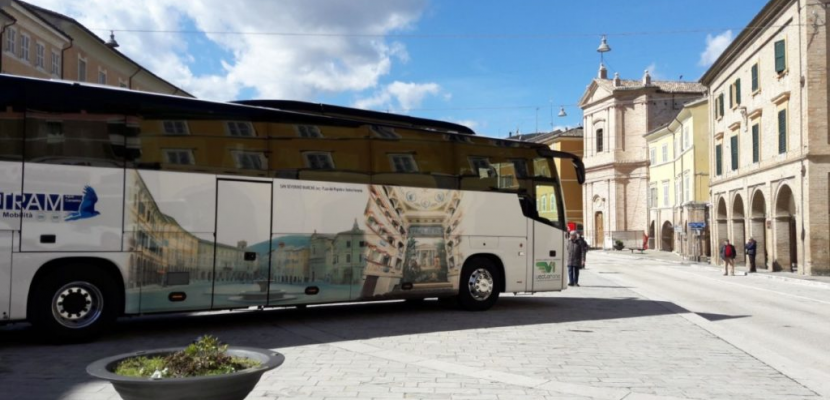Image

The DRT system of TWIST - Transport WIth a Social Target
Published on 07 January 2019

Italy
Marche
This is the good practice's implementation level. It can be national, regional or local.
About this good practice
The TWIST project (January 2004- June 2007, INTERREG III B Cadses) was oriented towards the promotion of the mobility in underprivileged areas by experimenting Demand Responsive Transport (DRT) systems in several regions across Europe, in order to reduce the social and economic exclusion of the local population.
Marche Region, as partner of TWIST Project, realized for one year a pilot project on inter-urban public transport along the mountain territories of the Alto Maceratese. The territories involved in the project are mostly represented by weaker social groups (90% of the public transport’s users) such as elderly.
After the conclusion of TWIST project, the local transport company CONTRAM adopted the DRT System for the urban service (integrating the the conventional service) of Camerino City and extra – urban lines in the Province of Macerata. The flexible transport's service is still active and it's also been extended to the Camerino's University and other internal mountain area.
The DRT System is based on a call center, using a toll-free number answered by an employee. Inside the vehicles, brochures illustrating the timetables for all the routes are distributed. In order to heighten awareness, a brochure has been sent to families in the rural areas. The buses are equipped with a system for tracking and for communicating with the operating headquarters, by means of GPRS/UMTS technology.
Marche Region, as partner of TWIST Project, realized for one year a pilot project on inter-urban public transport along the mountain territories of the Alto Maceratese. The territories involved in the project are mostly represented by weaker social groups (90% of the public transport’s users) such as elderly.
After the conclusion of TWIST project, the local transport company CONTRAM adopted the DRT System for the urban service (integrating the the conventional service) of Camerino City and extra – urban lines in the Province of Macerata. The flexible transport's service is still active and it's also been extended to the Camerino's University and other internal mountain area.
The DRT System is based on a call center, using a toll-free number answered by an employee. Inside the vehicles, brochures illustrating the timetables for all the routes are distributed. In order to heighten awareness, a brochure has been sent to families in the rural areas. The buses are equipped with a system for tracking and for communicating with the operating headquarters, by means of GPRS/UMTS technology.
Expert opinion
Demand-responsive transport (DRT) provides a number of social benefits, increasing opportunities for people with limited mobility, or those who are socially marginalised. However, DRT can also have significant environmental benefits through reducing the number of private vehicles on the road and acting as last mile solutions for linking communities with broader transport networks. This practice both serves weaker social groups, and provides links with conventional transport services, and can be taken as inspiration for regions with disperse or marginalised populations (in particular).
Works at
Interreg Europe Policy Learning Platform
Resources needed
According to CONTRAM experience, the extra cost of a DRT system (mainly related to employees working in the booking-management center) can be supported merging it on a wide public transport network able to guarantee a positive balance. The main objective remains anyway to guarantee a social service
Evidence of success
The main evidence is that a public transport company has made own - and is still using – the DRT System developed inside an European project. The capacity to involve stakeholders, like university, public bodies, has strengthened the aim to realize a social service for the mobility of weakers users living in low-demand areas. The local DRT system experience demonstrated that such modality can be a flexible and adaptable transport systems to unexpected situation or change in mobility patterns
Potential for learning or transfer
The practice has been presented during the Study Visit of TRAM Project held in 2018 in Marche Region. All participants noticed how the DRT system had the positive effect to provide the local institutions and the public transport companies with flexibility and capacity to adapt to changing conditions. Such capability is considered of high strategic value for changing contexts experiencing relevant socio-economic pressures, as ageing of population or changing quality of life in rural areas. DRT systems shall be seen not only as an environmental-friendlier means of transport, but rather a strategy for social inclusion and socio-economic development of local communities.
Inpired by Marche Region experience with TWIST project, two TRAM Project Partners (Regional Ministry of Public Works and Housing of Andalusia from Spain and Bleckinge Region form Swedish) are evaluating to develop a DEMAND RESPONSIVE TRANSPORT SYSTEM in their territories within the TRAM Project – Phase 2.
Inpired by Marche Region experience with TWIST project, two TRAM Project Partners (Regional Ministry of Public Works and Housing of Andalusia from Spain and Bleckinge Region form Swedish) are evaluating to develop a DEMAND RESPONSIVE TRANSPORT SYSTEM in their territories within the TRAM Project – Phase 2.
Further information
Website
Good practice owner
You can contact the good practice owner below for more detailed information.
Organisation
Contram S.p.A

Italy
Marche
Contact
Technical Assistance for TRAM INTERREG EUROPE Project
